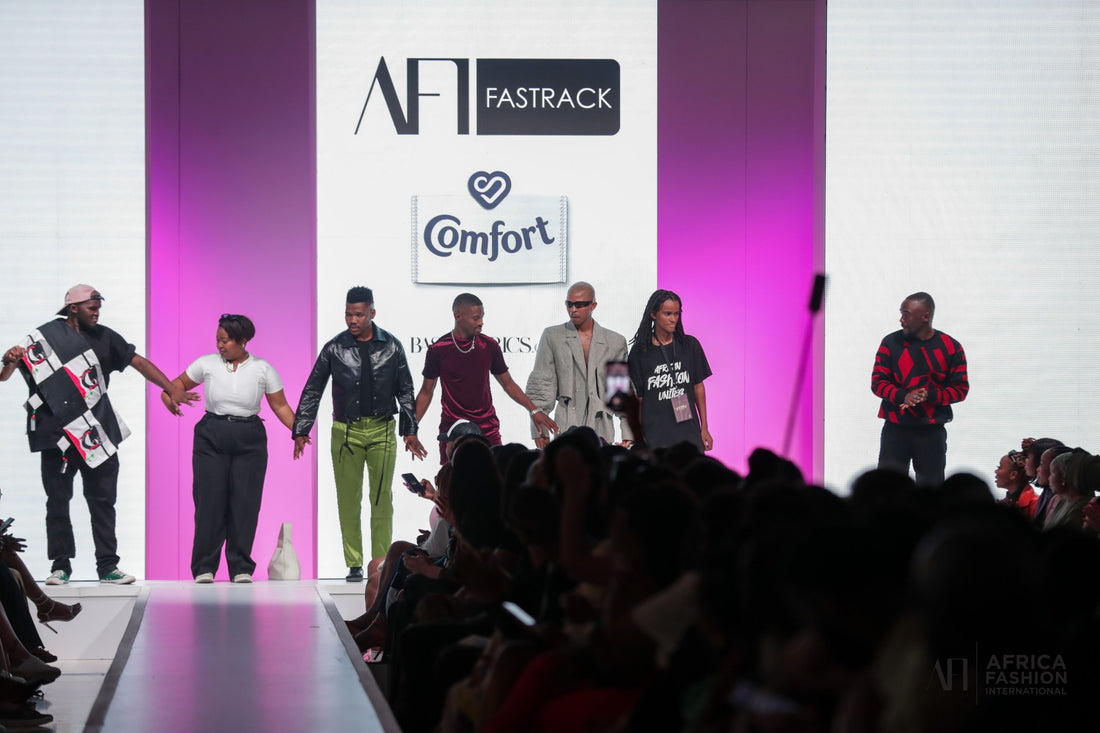
Exploring the AFI Fastrack Collections at Joburg Fashion Week
Share
Ranji Mangcu
- AFI Fastrack 2023 finalists presented capsule collections at Joburg Fashion Week with a focus on sustainability.
- The challenge required finalists to create collections targeting their Gen-Z peers and produced through sustainable practices.
- Judging criteria included the use of upcycled materials, repurposed clothing, and materials supplied by the Clothing Bank.
Fashion weeks across the globe are raising the standard by implementing sustainability criteria for potential labels. Denmark’s Copenhagen Fashion Week is leading the way for other global fashion weeks by implementing minimum standards based on an extensive "Sustainability Requirements Document."
These standards cover the entire fashion value chain and promote transparency among designers regarding their existing sustainability efforts.
The requirements cover a range of sustainable production and business practices, such as keeping unsold clothing in rotation, prioritising quality design, promoting economic and material value, and increasing transparency regarding the longevity of garments.
This also includes utilising sustainable materials, whether they be upcycled, recycled, or sourced from dead-stock.
Since its launch in 2022, this initiative has prompted brands to consider their carbon footprints and compelled competitors to reassess their methods. As a result, international standards for sustainable and ethical practice are gradually being implemented.
It was from a similar standpoint that Africa Fashion International challenged its AFI Fastrack 2023 finalists to centre sustainability in their Joburg Fashion Week collections.
The finalists – Loice Dube of Lo’Ice, Xhanti Mpu of XHVNTI, Thandazani Nofingxana of Abantu, Xolani Magadla and Mawande Mbawuli of Xolani Mawande, Botshelo Molete of Mekhukhu, Mimangaliso Ndiko of Sixx6 and Kgotsofalo Given Monyamate of Articles of Mars – presented capsule collections that highlighted their signature styles and their skills at working with textiles.
Launched in 2011, the AFI Fastrack programme serves as an incubator program for aspiring designers. The program has helped cultivate renowned talents such as Thebe Magugu, Rich Mnisi, Nao Serati, Hugo Flear and Shamyra Moodley of LaaniRaani.

Joburg Fashion Week design by Loice Dube of Lo'ice
The main objective of AFI Fastrack is to familiarise participants with the inner workings of the fashion industry and equip them with essential tools and connections to succeed in their careers.
The 2023 cohort began their AFI Fastrack adventure at Cape Town Fashion Week and have since faced a range of tasks. They debuted their first look as finalists, worked behind the scenes to understand what goes into the production of a fashion show; competed in the Durban July fashion competition, and attended business seminars focused on the fashion industry. Throughout the year, they have been diligently preparing themselves and their brands for successful business ventures.
Joburg Fashion Week design by Kgotsofalo Given Monyamate of Articles from Mars
For their final challenge, the AFI Fastrack finalists were tasked with creating a capsule collection that was both sustainably produced and targeted towards their Gen-Z peers. This collection would be presented at Joburg Fashion Week.
The finalists would be judged on a set of criteria built around their ability to develop products that serve an identified target audience and weave sustainable practice into their brands to build a capsule collection.
Joburg Fashion Week design by Thandazani Nofingxana of ABANTU
A key factor of the judging criteria was the use of upcycled materials, repurposed clothing and materials supplied by the Clothing Bank.
The finalists started by building a buyer profile – a character sketch outlining their target market’s archetype and identity. They had to consider the demographic, geographic and psychographic realities of their client.
Joburg Fashion Week design by Botshelo Molete of Mekhukhu
To create a collection that appeals to this archetype, it was necessary to not only understand the socio-economic and cultural influences and beliefs that attract their buyer to their brand, but also consider how they could use those factors to make conscious fashion appealing to them.
Curating mood boards, designing garments and sampling fabrics around this character, their mission was to build a wardrobe that demonstrated their brand’s understanding of their customer, and their aspirations for the African fashion labels that they are each building.
Joburg Fashion Week design by Xhanti Mpu of XHVNTI
Overall, the challenge encouraged these up-and-coming designers to not only think outside the box and be resourceful with regards to quality, creativity, wearability, trans-seasonality, and function, but also to view their brands as contributors to the global movement towards a sustainable fashion future.
The final product showcased their individual design aesthetic and expertise in working with textiles. A distinct point of view was evident with the choices each designer made in their final pieces.
Joburg Fashion Week design by Mimangaliso Ndiko of SIXX6
The collections not only showed how they valued storytelling, but also understanding how to create collections for the different audiences their brands may attract.
As pointed out by Botshelo Molete of Mekhukhu, a capsule collection is a great opportunity for fashion labels to work sustainably. Done well, it pushes designers to think beyond sales and explore wearability, adaptability and durability.

Joburg Fashion Week design by Xolani Magadla & Mawande Mbawuli of XOLANI MAWANDE
Rather than being absorbed in newness and told what to wear and how to wear it by an unending trend machine, consumers are encouraged to be more thoughtful and showcase their own ingenuity.





